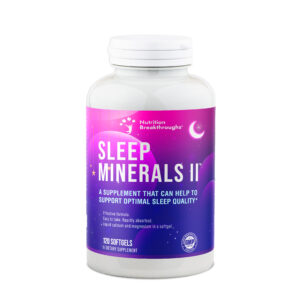 Millions of people turn to prescription sleeping pills each night in an effort to get some sleep, but these come with side effects and addiction.
Millions of people turn to prescription sleeping pills each night in an effort to get some sleep, but these come with side effects and addiction.
Research published in the British Medical Journal links these drugs to dizziness, memory problems, dependence, and a higher risk of falls and accidents.
With these warnings, more people are looking for safer, more natural alternatives. One effective product that has gained popularity is Sleep Minerals II from Nutrition Breakthroughs, a natural remedy for deeper sleep and better health.
Sleep Minerals II combines four key nutrients: calcium, magnesium, vitamin D, and zinc. Together, these minerals not only encourage deep, refreshing sleep, but also strengthen bones and joints, boost immunity, calm restless legs, relieve muscle cramps, and ease menopause symptoms.
Many people have asked the following Frequently Asked Questions. Here are the answers.
- WHAT MAKES SLEEP MINERALS II SO EFFECTIVE?
✅ It is the original, drug-free, calcium and magnesium formula for better sleep, with thousands helped over the last 19 years. It features a special softgel form with the ingredients mixed with healthy oils. This creates a creamy paste inside that absorbs into the body more deeply than tablets, capsules or gummies.
✅ It also provides great nutritional support for bone health, muscle cramps, stomach health, menopause insomnia, and restless leg syndrome.
- WHAT ARE THE DIRECTIONS FOR USING SLEEP MINERALS II?
✅ For any difficulty with falling asleep or staying asleep, take one softgel with water, 30 to 45 minutes before bed. It’s helpful to take it with a bit of food.
✅ Stay with one softgel for at least a week or two to let the minerals build up in your system. Sometimes a person will need to take two.
✅ Reduce the dose if you become drowsy during the day. You can also take it earlier than at bedtime, such as at dinner time or a couple hours before bed with a healthy snack.
✅ Another option is to take a half softgel before bed and another half if you wake up in the night and can’t get back to sleep.
- HOW LONG DOES IT TAKE TO WORK?
✅ Some people start noticing good effects after the first or second week of use – some sooner, some later. Be sure to continue taking the product as being consistent is key.
- WHAT ELSE CAN I DO TO GET BETTER SLEEP?
✅ Go outside for a walk each day and look around at your surroundings. It’s not so much the exercise factor as the extroversion factor. Look at things that are larger than the things you normally look at or focus on inside. This will help the body to relax.
✅ If it’s too cold, walk around in a large indoor space. Walk until you feel refreshed. Also, do some mild exercises such a stretching. If you work at a computer, take regular breaks and spend part of your time standing.
✅ Focus on eating healthy, whole foods like proteins, vegetables, fruits, nuts, seeds, olive oil, and whole grains. Reduce junk foods or fast foods.
- IS SLEEP MINERALS II SAFE TO BE TAKEN WITH MEDICATION?
✅ This supplement is generally safe, containing natural vitamins and minerals and is not habit forming. If you’re taking any medication, its best to take it at least an hour or two apart from the Sleep Minerals, as each thing may have a different effect.
6. DO YOU OFFER A GUARANTEE?
✅ Yes, your purchase is covered by a 30-day money-back guarantee. Stay in touch with us as sometimes the use of the product needs to be customized to individual needs. Contact us with any questions that come up and you’ll get a quick response.
Email: info@nutritionbreakthroughs.com
- WHAT IF I DON’T DO WELL WITH SWALLOWING PILLS?
✅ There are some options for you. One is that you can pierce the end of the softgel open with a sharp knife and squeeze the creamy paste out and drink it down with water. It can also be spread onto some food or a cracker with nut butter (or a different topping) and then eaten.
- CAN I CONTINUE TO TAKE MY REGULAR CALCIUM AND MAGNESIUM SUPPLEMENT OR MULTIPLE VITAMIN-MINERAL SUPPLEMENT?
✅ It is totally fine to continue to take your regular supplements. These are generally taken during the day, whereas Sleep Minerals II is taken in the evening.
✅ The calcium and magnesium in a hard tablet or a capsule is different than the softgel form of minerals found in Sleep Minerals II, and is generally not absorbed as well. So there isn’t a large chance of getting too many minerals.
Two customers share their reviews:
⭐⭐⭐⭐⭐ Suzanne G. of Tucson, Arizona says: “I am now taking two Sleep Mineral II capsules each night. I have had insomnia for most of my life and the longer I take Sleep Minerals, the better I sleep. The best thing is that I can now get back to sleep if I wake up in the night. It has given me such a sense of peace to know that I now can be well rested during the day. I have tried many products on the market and this is the one that is gold. Thank you so much for producing a quality product!”
⭐⭐⭐⭐⭐ Richard P. of Parkville, Maryland says: “The Sleep Minerals II are making quite a difference. I was regularly waking up at around 3:00 a.m. and after a few days use my sleep improved quite a lot. I wake up once a night to go to the bathroom, but the great thing is, I then fall back asleep and sleep several more hours. This has been a great improvement.
For more details, visit the Sleep Minerals II page.







